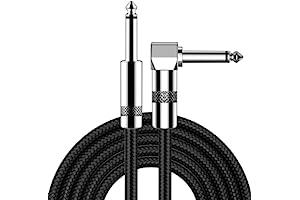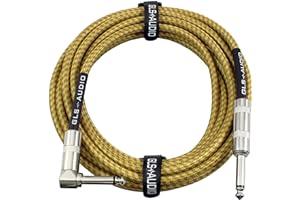Best Selling Instrument Cables: The Unsung Heroes of Your Music
Often overlooked, instrument cables play a crucial role in the quality of your music. They are the unsung heroes that carry the signal from your instrument to your amplifier, ensuring that your sound is clear, consistent, and free of interference.
Choosing the Right Instrument Cable
With so many different instrument cables on the market, it can be difficult to know which one is right for you. Here are a few things to consider when making your choice:
- Length: The length of your cable will depend on the distance between your instrument and your amplifier. It's important to choose a cable that is long enough to reach, but not so long that it becomes a tripping hazard.
- Type of Connector: There are two main types of connectors used for instrument cables: TS and TRS. TS connectors are typically used for unbalanced signals, while TRS connectors are used for balanced signals. Be sure to choose a cable with the correct type of connector for your instrument and amplifier.
- Quality of Construction: The quality of construction of your instrument cable will also affect its performance. Look for cables that are made with high-quality materials and construction techniques. This will ensure that your cable will last for years to come.
Links to Best Selling Instrument Cables
- New bee Guitar Cable 10ft Electric Instrument Bass AMP Cord for Electric Mandolin, Pro Audio (Right Angle to Straight, Black) (paid link)
- GLS Audio Instrument Cable - Amp Cord for Bass & Electric Guitar - Straight to Right Angle 1/4 Inch Instrument Cable - Brown/Yellow Braided Tweed, 20ft (paid link)
Caring for Your Instrument Cable
Once you've chosen the right instrument cable, it's important to take care of it properly. Here are a few tips:
- Store your cable properly: When you're not using your instrument cable, store it in a cool, dry place. Avoid exposing it to extreme temperatures or humidity.
- Keep your cable clean: Dirt and grime can build up on your instrument cable over time, which can affect its performance. Be sure to clean your cable regularly with a soft cloth and a mild detergent.
- Inspect your cable regularly: Look for any signs of damage, such as cuts, nicks, or fraying. If you find any damage, replace your cable immediately.
Conclusion
Instrument cables are an essential part of any musician's toolkit. By choosing the right cable and taking care of it properly, you can ensure that your music sounds its best.
Note: As an Amazon Associate I earn from qualifying purchases.
best-sellers-musical-instruments
instrument-cables
best-sellers-musical-instruments-instrument-cables

